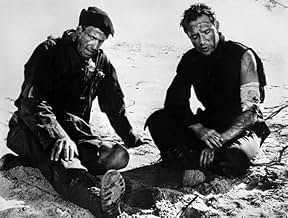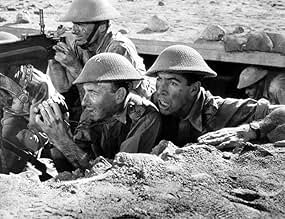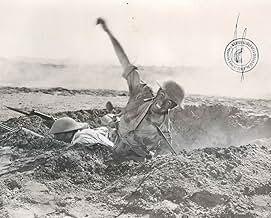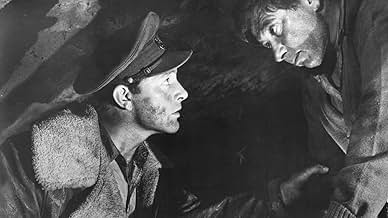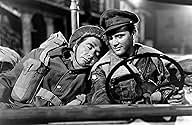Füge eine Handlung in deiner Sprache hinzuRichard Burton plays a Scottish Army officer put in charge of a disparate band of ANZAC troops on the perimeter of Tobruk with the German Army doing their best to dislodge them.Richard Burton plays a Scottish Army officer put in charge of a disparate band of ANZAC troops on the perimeter of Tobruk with the German Army doing their best to dislodge them.Richard Burton plays a Scottish Army officer put in charge of a disparate band of ANZAC troops on the perimeter of Tobruk with the German Army doing their best to dislodge them.
- Für 1 Oscar nominiert
- 1 Gewinn & 1 Nominierung insgesamt
- Lt. Harry Carstairs
- (as Charles Tingwell)
- English Officer
- (Nicht genannt)
- Corporal
- (Nicht genannt)
- British Officer
- (Nicht genannt)
- Sergeant
- (Nicht genannt)
- German Lieutenant
- (Nicht genannt)
- German Gunner
- (Nicht genannt)
- German Radio Man
- (Nicht genannt)
- German Orderly
- (Nicht genannt)
- Colonel
- (Nicht genannt)
Empfohlene Bewertungen
Although the story has neither the forced authenticity of 'The Longest Day' or the Hollywood panache of 'Where Eagles Dare' I believe it still manages to stand out in a special place on its own. Prior to a host of many other war movies it was the first to concentrate exclusively on the common soldier in the trenches, his anxieties for the present and hopes for the future. I also liked the side story of the young captain who is surprised to have under his command a favourite old school master, Bartlett played by Robert Newton. It causes some quizzical looks amongst the men, especially when he insists on continuing to address the old private as sir. Here the Desert Fox is played with dignity and respect by James Mason. The other german characters are also portrayed benignly, perhaps in view of the fact that very few atrocities were committed by Rommel's troops unlike their counterparts in Eastern Europe. History records accurately what eventually happened to Rommel in the aftermath of the plot to assassinate Hitler but here that is all in the near future. I recommend this b & w film to all war movie buffs of this English made genre but if you're looking for 'Saving Private Ryan' perhaps you should give it a miss.
Despite it's age, most of the attempts at special effects (artillery in the distance, explosions done via matte) come off well. As for the scenes where they really shoot off some pyrotechnics, they spared no expense! The overall portrait of the desert and army life looks very real and has the ring of truth. The plot is exciting and never drags.
The only problems are the over-patriotic script (I guess we should cut them some slack here, this movie was made much closer to the war than we are today!) and as noted elsewhere, the inappropriate German weapons. It's amazing that they used Thompson machine guns instead of MP40's, when for the next 30 years everybody from "The Man from U.N.C.L.E." to James Bond would use the MP40 all over the place. In summary I think this movie was a bit better than I expected and holds up well to repeated viewings.
The most fascinating part of this film is to watch both the marvelous Robert Newton and the under-rated James Mason give Richard Burton acting lessons.
Burton tends to chew the scenery when he snarls, "Good-morning," as though he were the youngest in a large family, doing anything for attention.
Newton counters Burton's unnecessary histrionics with a beautifully modulated realization of-himself in disguise as Prof. Bartlett, Burton's old instructor. I think this is the most honest look at the REAL Newton on film. The rueful man who clearly understands his inability to stay sober, but still has enough control to see his own and everyone else's situation clearly. He is the kind, timorous, brilliant failure who, in one burst of glory, up-stages his more successful juniors. Newton delivers a truly magical performance.
James Mason also delivers a balanced and multi-layered Rommel. Of course he practiced playing this brilliant German General in the better-known film, The Desert Fox.
Burton comes across as pure ham in The Desert Rats, but there IS one scene he has where he is honest and effective. He explains to Bartlett that the picture of the young woman in his wallet is his wife. The picture actually IS Burton's wife, pre-Elizabeth Taylor.
Otherwise, although Burton is billed as the star, the film belongs to Newton and Mason. See it for the pleasure of their company.
Wusstest du schon
- WissenswertesThe film was banned in Egypt, as the British were still occupying the Suez Canal and the Sudan.
- PatzerDuring the raid on the German camp there is a sign on a building reading "Hauptquartiers". Although the English word "Headquarters" might suggest a plural s, in German there doesn't exist such a form. The correct word would be "Hauptquartier" and the plural "Hauptquartiere"
- Zitate
Tom Bartlett: You don't know much about real fear, Tammy. Maybe it comes with age or the bottle. You don't know what it is to be a coward... really a coward. To know it, yet to hope one day something will happen to prove that you're not, yet half the time not really believing that either.
- Crazy CreditsOpening credits prologue: 1941 LIBYAN DESERT NORTH AFRICA
- VerbindungenEdited into All This and World War II (1976)
- SoundtracksWaltzing Matilda
(1895) (uncredited)
Original music by Christina Macpherson (1895)
(Based on the Scottish tune "Craigielee", music by James Barr, with words by Robert Tannahill)
Revised music by Marie Cowan (1903)
Lyrics by A.B. 'Banjo' Paterson (1895)
Played during the opening credits and often in the score
Top-Auswahl
- How long is The Desert Rats?Powered by Alexa
Details
Box Office
- Budget
- 1.320.000 $ (geschätzt)
- Laufzeit
- 1 Std. 28 Min.(88 min)
- Farbe
- Seitenverhältnis
- 1.37 : 1


